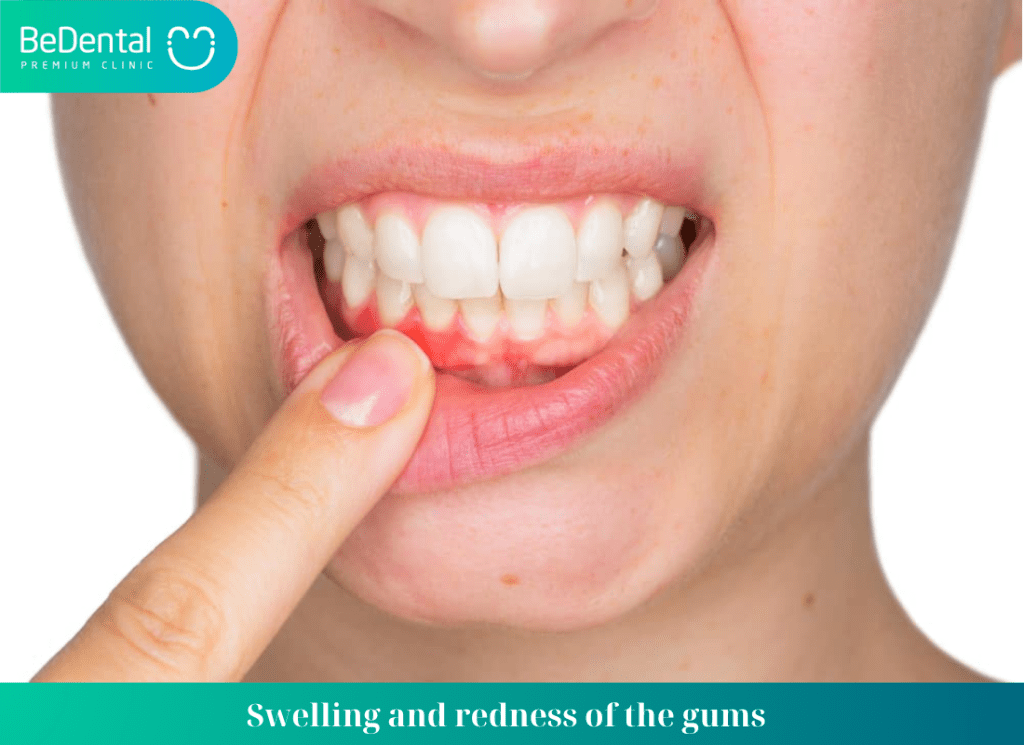Toothache is a common sign when you have cavities, wisdom teeth erupting, gum inflammation, etc. Tooth pain can affect the nerves and cause a lot of discomfort and pain for the patient. If you don’t have time to see a dentist, the following article show you the Summary of Simple Ways to Relieve Toothache.
What consequences can prolonged toothache lead to?
Toothache is a common sign that can occur at any age and is a concern for many people. According to the latest statistics, up to 3 billion people worldwide have oral health issues, and this number continues to increase every year, with toothache being the most common symptom. The causes of toothache are very diverse, such as cavities, gum inflammation, wisdom teeth erupting, etc.
In particular, if prolonged toothache is due to cavities and the patient does not actively seek treatment, it can lead to the spread of damage. When the consequences become severe, the tooth is severely decayed, and the dentist may need to extract it and use dentures.
Furthermore, frequent toothaches can make the patient tired and directly impact their daily activities and life. If toothache persists and occurs frequently, it can affect the nerves, so this condition should not be underestimated.
See more: 10 benefits to help you answer the question : “Are porcelain veneers necessary?”

Summary of simple ways to relieve toothache
If you can’t schedule time to visit the dentist, you can apply simple home remedies to temporarily reduce pain and ensure your daily activities. However, these methods are only temporary solutions for toothache, so it is still advisable to seek a dentist for diagnosis and treatment.
Here is a compilation of simple ways to help relieve toothache:
Treating toothache with saltwater
When it comes to oral hygiene and addressing related issues, saltwater is an essential component. For toothache, you can rinse your mouth with saltwater several times a day to prevent bacterial attacks on the affected area and reduce swelling and inflammation.
It is recommended to use sea salt as it contains minerals that help reduce pain and promote effective wound healing.
See more: Preventation of tooth decay in children
To prepare saltwater, you can follow the following ratio: add a teaspoon of salt to a glass of warm water, stir until the salt dissolves, then rinse your mouth. Pay attention to the taste of the slightly salty water to determine the right amount of salt, without making it too salty.
Treating toothache with a cold compress
One of the quick and easy pain relief methods for toothache is applying a cold compress. However, this method only provides temporary pain relief and is effective for acute inflammation-related toothache.
To quickly relieve pain, you can apply a cold compress as follows:
- Place some ice in a cloth or thin towel. This cloth layer will help reduce the ice’s temperature, preventing harm to the skin and oral mucosa.
- Apply for about 20 minutes each time and only apply the cold pack through the covering cloth, avoiding direct contact with the skin.

Using onions to effectively treat toothache
Onions contain antibacterial and anti-inflammatory properties that can help kill harmful bacteria in the mouth, reduce inflammation, and effectively alleviate toothache. Particularly, in cases of toothache caused by infection in the tooth and gums, using onions can help prevent and reduce bleeding, allowing patients to quickly visit a dentist for examination.
Here is how to use onions to treat toothache:
- Slice a large onion for use and storage for multiple applications.
- Chew a slice of onion focusing on the area of toothache until the pungent onion smell fades.
- Continue chewing other onion slices until the symptoms gradually decrease. If the toothache persists, you can squeeze the onion to extract juice and apply it directly to the painful tooth area.
See more: Early Detection of Periodontitis Through These Signs
Treating toothache with clove
Clove is a common spice, particularly famous in Indonesia for its active ingredient Eugenol, which has numbing, antibacterial, and anti-inflammatory properties. Therefore, in cases of toothache, tooth infections, gum inflammation, using clove can temporarily reduce pain, inflammation, and kill bacteria.
For sudden toothache, experts recommend using clove to alleviate discomfort. While patients may feel more comfortable, it is essential to remember that this method only provides temporary symptom relief and cannot completely cure the pain. Seeking medical attention and continuing treatment is necessary to avoid serious complications in the future.
Placing garlic near the painful tooth
Garlic is a common medicinal ingredient in the medical field, containing allicin that has antibacterial and pain-relieving properties for toothache.
To use garlic for toothache relief, you can follow these steps:
- Prepare a fresh garlic clove, crush it, and dilute it with water to reduce concentration and avoid irritation.
- Then, mix the diluted garlic with a little salt evenly.
- Finally, apply this mixture to the painful tooth area for 10-15 minutes.

Soak honey
For a long time, honey has been known as a medicinal remedy that can help reduce gum swelling and toothache. To apply, first identify the area of the painful tooth. Then, take a spoonful of honey and apply it to the painful area, then soak it in your mouth for about 5 minutes. Doing this action several times can temporarily alleviate the pain.
Drink peppermint tea
First, boil water for about 20 minutes. Then, steep dried peppermint leaves in the boiled water. Once the water cools down, you can use this solution for drinking or mouth rinsing. The tannin compound in peppermint leaves has antibacterial, anti-inflammatory properties, numbs wounds, and quickly reduces pain.
See more: What is Zirconia Dental Crown?
Use pain relievers
Tylenol and Ibuprofen are two safe pain relievers that you can use when experiencing toothache. However, remember that they only provide temporary pain relief without solving the underlying issue.
To ensure safety and effective treatment for the pain, avoid overusing medication. Instead, seek timely medical attention. At a hospital or dental clinic, experts will help identify the cause of the problem and suggest the most appropriate treatment method for you.
Use aloe vera gel
Aloe vera contains many important vitamins such as A, C, E and minerals like Calcium, Magnesium, Phosphorus, etc., which inhibit bacterial growth, have anti-inflammatory properties, and effectively reduce pain.
Instructions:
- Prepare an aloe vera leaf.
- Cut the leaf to extract the aloe vera gel.
- Apply this gel to the painful tooth area.
- Wait for 10-15 minutes then rinse your mouth with warm water. As a result, the toothache will be partially reduced.
See more: Do braces hurt?
Use fresh ginger water
A safe at-home method to reduce toothache that many people use is using fresh ginger water. The active compounds tecpen, oleoresin, and zingibain in ginger have antibacterial, anti-inflammatory properties, provide immediate pain relief, and reduce bad breath.
The process is quite simple, you need to peel and crush the ginger, then apply it to the painful tooth area for about 10-15 minutes.

Using lime leaf essential oil
Essential oil extracted from lime leaves has long been known for its anti-inflammatory, antibacterial, and pain-relieving properties for toothaches.
Instructions:
- Clean lime leaves to obtain lime leaf essential oil.
- Boil lime leaves with one liter of water and a tablespoon of salt over low heat.
- Wait for 10-15 minutes, then turn off the heat and let it cool.
Once it has cooled, pour the essential oil into a clean bottle for gradual use. After each oral hygiene routine, you can apply the essential oil to the painful tooth area using a cotton swab.
See more: What are crooked front teeth?
Elevate your pillow when sleeping
To reduce toothache and facilitate falling asleep easier, you can use 1 to 2 soft pillows to elevate your head while lying down. This will help limit blood pooling at the tooth roots, reduce pain, and create conditions for easier sleep.
However, it is important not to elevate the pillow too high or too hard, as this can affect the spine. Toothaches can stem from various causes, so for effective treatment, you should consult a doctor to determine the cause and receive appropriate treatment.
Most asked questions
Can certain foods or drinks worsen toothache?
Yes, certain foods or drinks can worsen toothache or tooth sensitivity. Some common culprits include:
- Sugary foods and beverages: Consuming sugary foods and drinks can lead to tooth decay and cavity formation, which can exacerbate toothache.
- Acidic foods and drinks: Acidic foods and beverages, such as citrus fruits, vinegar-based dressings, and carbonated drinks, can erode tooth enamel and increase tooth sensitivity, leading to toothache.
- Hot or cold foods and drinks: Extreme temperatures in foods and drinks can trigger tooth sensitivity and worsen toothache, especially in individuals with sensitive teeth or dental issues.
- Hard or crunchy foods: Eating hard or crunchy foods can put pressure on sensitive teeth or teeth with cavities, causing pain and discomfort.
- Spicy foods: Spicy foods can irritate sensitive teeth and gums, leading to increased pain and discomfort in individuals with toothache.
It is important to be mindful of your diet and avoid consuming foods and drinks that can worsen toothache or tooth sensitivity. Maintaining good oral hygiene practices and seeking dental care when needed can help prevent and alleviate toothache.
See more: What is a misaligned bite?
How can I differentiate between a normal toothache and a more serious dental issue that requires immediate attention?
It is important to be able to differentiate between a normal toothache and a more serious dental issue that requires immediate attention. Here are some signs that may indicate a more serious dental problem:
- Severe, persistent pain: If you are experiencing intense and continuous pain that does not seem to improve with home remedies or over-the-counter pain medication, it may indicate a more serious dental issue.
- Swelling or inflammation: Swelling of the gums, face, or jaw accompanied by pain can be a sign of infection or abscess, which requires prompt dental evaluation and treatment.

- Fever: A fever along with toothache may indicate an infection that has spread, such as an abscess, and requires immediate attention from a dentist.
- Prolonged sensitivity to hot or cold: If you have persistent sensitivity to hot or cold temperatures in your teeth, it may be a sign of nerve damage or an underlying dental problem that needs professional assessment.
- Pain when biting or chewing: Sharp pain when biting down or chewing can be a sign of a cracked tooth, decay, or other dental issues that require evaluation by a dentist.
- Bleeding or discharge: If you notice bleeding from the gums, discharge around a tooth, or foul-tasting drainage, it may indicate an infection or abscess that needs immediate dental care.
If you experience any of these symptoms or if your toothache is accompanied by other concerning signs, it is important to seek prompt evaluation and treatment from a dental professional. Ignoring serious dental issues can lead to complications and further dental problems.
See more: How to attach gems to teeth?
Tư vấn chuyên môn bài viết:
BÁC SĨ DƯƠNG THỊ THÙY NGA


 Tiếng Việt
Tiếng Việt 한국어
한국어 日本語
日本語 中文 (中国)
中文 (中国)



